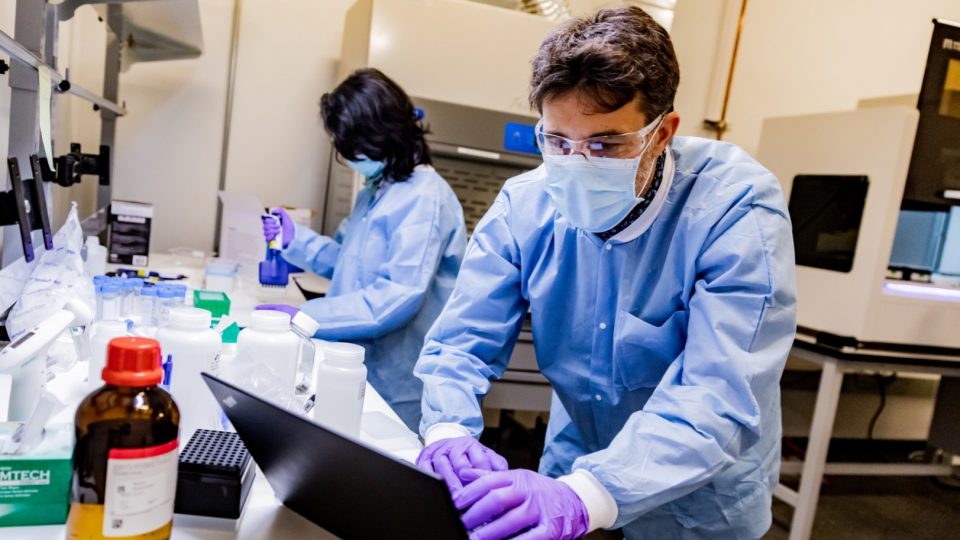Today, leading organizations and countries announced new commitments to help strengthen efforts to end neglected tropical diseases (NTDs). These commitments, made by endemic countries, donors, and private sector partners, are a response to a global call for urgent investment to control, eliminate, and eradicate NTDs by 2030.
NTDs is an umbrella term used to describe a group of communicable diseases that affect over 1.7 billion people. NTDs cause immeasurable suffering. They debilitate, disfigure,, and can be fatal. They are also a major barrier to economic development.
The commitments announced today from Ghana, GSK, and Anesvad Foundation will help to accelerate efforts to control and eliminate NTDs in affected countries. The new commitments include funding and drug donations, as well as new endorsements of the Kigali Declaration on NTDs – a high-level, political declaration that is mobilising political will, community commitment, resources and action, and securing commitments needed to end the suffering caused by NTDs.
President of Ghana, Hon. Nana Akufo-Addo said: “In Ghana, we are proud to be the first country in Sub-Saharan Africa to have eliminated trachoma. We’ve also eliminated Guinea worm disease from our land. Further, we are on the brink eliminating sleeping sickness and leprosy. Investing in NTD elimination programmes creates a ripple effect in society.
It leads to better education, health and employment outcomes. It transforms lives and our communities. It helps reduce gender inequity and stigma. That is why I am proud to endorse the Kigali Declaration on NTDs. An Africa free from NTDs is possible. Let us act now, and act together. Ghana is 100% Committed to ending neglected tropical diseases.”
Thomas Breuer, Chief Global Health Officer, GSK said: “I am delighted that GSK is further extending its donation commitment for soil-transmitted helminthiasis (STH) to 2030, a disease which affects 1.5 billion people per year, predominantly from the most underserved communities.
Alongside an ongoing commitment to donate our medicines until Lymphatic Filariasis is eliminated as a public health problem everywhere, we will donate up to 100 million doses for STH per year from 2026 to 2030. At GSK, we remain 100% committed to ending NTDs in alignment with the WHO road map.”
Iñigo Lasa, Director General, Anesvad Foundation, said: “Anesvad Foundation has been working to reduce NTDs on a global scale since 1968. We are happy to announce that we have signed the Kigali Declaration on NTDs to mobilise 34m€ until 2026 to reduce the burden of skin-NTDs in Subsaharan Africa.”
In addition, the United States government appropriated $114.5 million for fiscal year 2023 to the U.S. Agency for International Development (USAID) to help control and eliminate five of the most burdensome NTDs. USAID’s support for NTDs focuses on the scale-up of efficient, integrated preventive chemotherapy as well as support for operational research, diagnostic research and development, and sustainability.
You can read more of such stories at The Cheer News and Credible News.
WHO Mission On mRNA Technology Transfer Initiative In Tunisia
Teamwork At All Levels Of WHO Aims To Save Millions Of Lives In The Greater Horn Of Africa
Reactions To A Woman Who Reportedly Admitted To Mixing Zobo Drinks With HIV Blood
Today, with Ghana signing the Kigali Declaration on NTDs, the total number of endemic country signatories is 12. This includes signatories from June 2022: Botswana, Djibouti, Ethiopia, Malawi, Nigeria, Papua New Guinea, Rwanda, United Republic of Tanzania, Timor Leste, Uganda, and Vanuatu.
The Declaration has garnered 61 signatories since its launch in June, mobilising over $1.6 billion for NTDs and over 19 billion tablets/units of medicine. Signatories include donor countries, pharmaceutical companies, multilateral organisations, NGOs, philanthropy organisations, civil society and community-based organisations, and others.
In 2022 alone, significant strides were made in the battle against NTDs. The Kigali Declaration on NTDs was launched at the Kigali Summit on Malaria and NTDs; Malawi, Togo, Vanuatu and Saudi Arabia succeeded in eliminating trachoma, protecting tens of millions of people from the world’s leading cause of blindness; Benin, Uganda, Rwanda, and Equatorial Guinea were able to eliminate sleeping sickness, a fatal illness caused by tsetse flies.
Now, 47 countries have eliminated at least one NTD. Yet, whilst efforts to tackle NTDs are a global success story, the impact of the COVID-19 pandemic is threatening hard-fought progress. According to a World Health Organization (WHO) global survey of health activities, NTD services were among those most frequently and most severely disrupted by the pandemic.
There was a 34% decline globally in the number of people receiving NTD mass drug administration (MDA) in 2020 compared to 2019, and MDA coverage only increased slightly in 2021.
This constitutes a serious threat to the global community’s ability to meet the targets laid out in the WHO NTD road map and the Sustainable Development Goals, which call for a 90% reduction in the number of people requiring an intervention against NTDs by 2030.
“We are thrilled to see the incredible progress fighting NTDs buoyed by new commitments from our partners,” said Thoko Elphick-Pooley, Executive Director of Uniting to Combat neglected tropical diseases
“NTDs have a devastating impact on the lives of affected individuals and communities, and it is crucial that we increase resources and action to control and eliminate these diseases. These new commitments are to be celebrated. However, we can’t stop here.
There is a financing crisis for NTDs. More resources are needed if we are to reach the targets of the WHO 2030 NTD roadmap and safeguard the hard-won gains of the past decades. This World NTD Day we are urging world leaders to act now, act together, and invest in NTDs. Let’s end the suffering caused by NTDs forever!”
You can read more of such stories at The Cheer News and Credible News.
BY DAYO ADESULU


